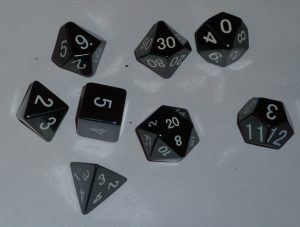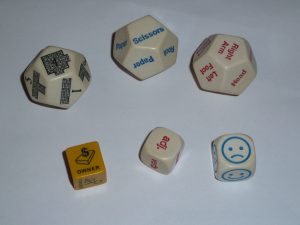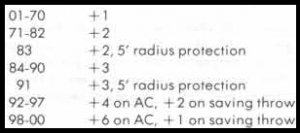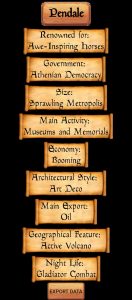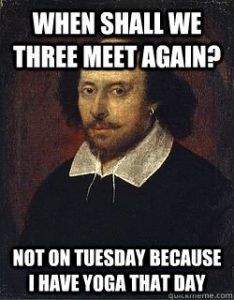Well, the one Lucretia has been asked to run is. “Bean” gaming cafe is opening soon, and have been looking for people to run some intro games. Lucretia stepped up to the plate, and we have been discussing what to run.

With a proposed player-base of six 10-13yr olds, and a 1-hour time slot, I suggested to keep everything as simple as possible, and concentrate on the players’ enjoyment.
So, here is what I came up with:
System

Opposed rolls.
The player must beat the GMs roll. The Warrior might have a Strength of d8, and the GM rules that Moving the Fallen Tree is a d10 task (It is a BIG tree!).
Player wins: Task Completed!
Tie = Player Wins.
GM Wins: Task eventually completed, but at some cost.
Costs can be ad-libed, to suit the situation, but can include:
- Lose a Health Token.
- Add a Minion Token to the Final Battle, or other Encounter (to represent the task taking longer, and the Big Bad having recruited more minions).
- Use a Special Token (e.g. a Mage “Spell” Token, or Elf “Nature” Token)
- Add an extra Encounter.
Overall, the players WILL succeed, but they will be somehow hindered later (less Tokens to use, more Enemies to face, etc)
Characters
A set of pre-generated Archetypes. The Elf, The Mage, The Warrior, etc.
Each will have an Index Card with their abilities on it, and a space to put some Tokens (more on these later).
Abilities:
All are d6 unless noted.
- Strong: Warrior has d8, Mage has d4.
- Quick: Rogue has d8, Dwarf has d4.
- Clever: Mage has d8
Fighting will usually be a Strong contest, but a player may come up with a way of using Quick or Clever. Losing a Fight roll means losing a Red Health Token (Minions only have 1). Especially with younger kids, fighting should never be “to the death”. Minions are knocked out (complete with stars spinning round their head), run away, or surrender.
Plot

The base plot-line for such a short Adventure is: Follow the clues to find and defeat the Evil “Twirly McMustache”!
The players will need a plot-hook to get them into the action. Some ideas to get kids involved:
- Your dumb sibling has been kidnapped
- Your Teacher has given you some Homework, but Twirly has run off with the answer sheet!
- Twirly has stolen your pet’s favourite toy!
You get the idea.
Players must follow clues, overcome challenges and face T. McMustache in a Boss Fight.
Challenges/Encounters
Suggested Encounters:
- Nature Challenge: A large tree blocks the path. A river or chasm must be crossed. A cliff to climb. A Twisty Forest where you might get lost.
- Minions: Usually a Combat Encounter.
- Puzzles: Keep to a minimum, due to time-pressures.
- Cryptic Old Man: Always an annoyance! He talks in riddles, but does hold useful clues.
Boss Fight
Eventually, the Players will face the Big Boss. he will have a number of Minions, possibly boosted by previous Failed rolls.
At the start of the Encounter, Minion Tokens can be Doubled-Up to create Big Minions, that use d8 instead of d6! (They could be Ogres instead of Goblins). When these Minions lose a Fight, they lose one Token, and revert to a d6.
This should be played up for excitement. Will they defeat him? Will they be in time? Can they come up with clever, fun, interesting ideas?
There will be a load of Minions, who can get in the way, hinder the Boss as well as the PCs, and generally be used for humour value, as well as ensuring pacing (if the players are having it too easy, Minions help the Boss. If the players are struggling, have them comically hinder the Boss, allowing the Players to pull off some cool moves!).
Assuming the players Win (which they should!), give them a big cheer, a bag of sweets, and send them off with stories to tell their friends!
Also, show them the D&D 5th Edition PHB, and wonder if the more advanced players might be interested in the “real”, more complex rules.
Back to the System
I talked about a few Statistics, that can be used for Opposed Rolls.
“Health” is measured in red Tokens, Each player has 3 (Mage has 2, Dwarf has 4). When you lose a Fight Roll, you lose a Token. If you run out of Tokens, you are DOWN AND OUT (for now …)
I also envisage each Character having some Unique Powers, that they can spend their 4 Special Tokens on:
Elf: Green “Nature” Tokens. Powers: Entangle, Talk To Trees, Pass Without Trace.
Dwarf: Brown “Mountain” Tokens. Powers: Soak Damage, Dwarf Bread, Talk To Rocks.
Mage: Blue “Mana” Tokens. Powers Magic Arrow, Detect Minions, Solve Clue
I don’t have all the Powers yet, but so long as everyone has something interesting on their Sheet, it should be good!
Summary
It’s not fully fleshed-out yet, but I hope you can see what I’m intending.
To badly mis-quote an Old Geezer who was there at the beginning of it all:
We’ll make up some sh*t, and hope that it’s fun!

